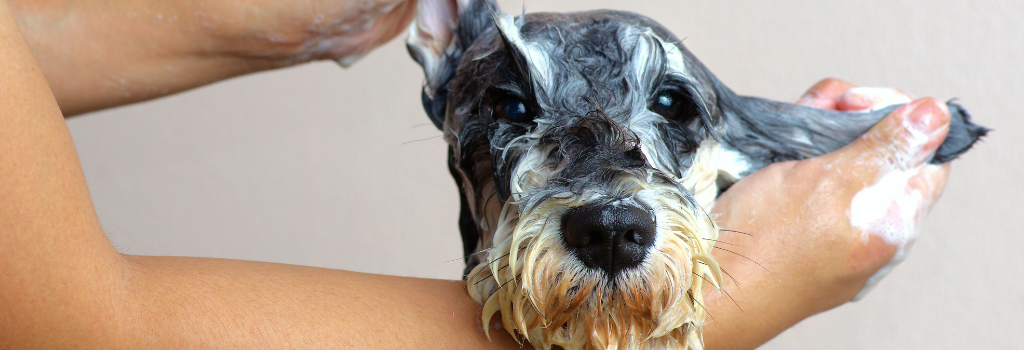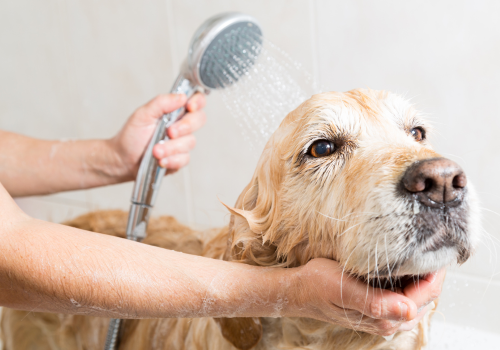Bathing and hygiene might not be as high on the list of priorities for pet owners as getting their dog on preventatives and microchipped but it plays a bigger role in overall wellness than most realize. Whether you turned to the internet because you realize this or, quite frankly, the odor coming from your dog was the impetus, we’re glad you found us! At Animal Care Center, we work diligently to bring you the accurate information you need. To avoid the false and misleading information that tends to float around the interwebs, we’ve taken the most frequently asked questions about dog bathing and hygiene and answered them thoroughly and accurately to get your dog in tip-top shape.
If you’re looking for a highly trained veterinarian in Oxford, MS, we’d love to see your dog to ensure bathing and hygiene are contributing to overall wellness, so please call us at (662)-234-8538.
What is a good hygiene regimen for a dog?
That depends on your dog and your lifestyle. For your average little purse dog that probably never touches the floor and just hangs out in your lap, regular grooming may not be as necessary as a big dog that’s out on long hikes and jumping in any body of water in sight. Dogs that like to swim a lot or dogs with certain medical conditions need more frequent baths.

The tasks that should be involved in a good hygiene regimen for dogs are:
- Regular nail trims
- Tooth brushing
- Ear cleaning
- Coat brushing
- Bathing
Nail trimming can be a sticking point in terms of anxiety and stress for some dogs, so you certainly need to work around your dog’s fears and potentially chat with your veterinarian about alternatives to actual nail trimming. Feel free to email us about this at [email protected].
How does keeping my dog clean contribute to good health?
Keeping your dog’s teeth clean can keep them healthier and more comfortable long-term. If you can imagine not brushing your teeth for months on end and the potential of tooth decay resulting from that, that's pretty uncomfortable and can lead to many health problems.
Dogs that are swimming regularly and dogs who get into things are at a higher risk for skin infections if they're not drying well or potentially exposing themselves to contaminated substances. Dogs with folds in their skin are especially prone to these infections, such as Shar Peis, Pugs, Boston Terriers, and Bulldogs.
Regular nail trims are essential for comfort while walking, especially in our older pets for traction. Active dogs can wear them down by being out and about on pavement or other surfaces but, still, all dogs need regular nail trimming.
Is brushing my dog's teeth important to overall hygiene?
Dog tooth brushing is a must, as it benefits dental health by regularly getting the plaque and bacteria off their teeth, maintaining good dental health long-term, and making for a happier, healthier dog.
And when you think about it, the teeth are kind of the window to the entire body—the gatekeeper, if you will. If the bacteria that can set up shop on those teeth stay there long enough, then the gums get inflamed, and now the dog has gingivitis. Also, bacteria can enter the bloodstream and cause issues in the heart valves, kidneys, and liver.
Image - Float
Why is it important to regularly clean my dog's bed, bowls, collar, leash, and toys?
The reason you want to bathe your dog’s bowls, beds, etc. is that they become colonized with bacteria if you don’t. If you can imagine wearing the same sweater every day, our hair and skin oils get stuck in there. Things also get stiff and unwieldy, and uncomfortable. The same goes for beds. As humans, we change our sheets regularly, so we want to change our dog's bedding regularly.
Wash not only food bowls but water bowls too. If you've ever stuck your hand in a dog's water bowl that's been sitting for a while, there's a gross film on the bottom of the bowl. So it's crucial to throw those bowls in the dishwasher or the sink at least once a week. Give them a good scrub, and make sure you're rinsing well, so there’s no soap residue. The same thing goes for collars and any sort of clothing they may wear, as those can also harbor bacteria.
What are some signs and symptoms of poor hygiene in my dog?
Signs of poor hygiene likely vary from dog to dog but there are certainly some commonalities.
Some of the signs of poor hygiene in dogs are:
- Matted fur
- Really dry, itchy skin
- A dull or greasy hair coat
- Foul-smelling breath, discoloration of teeth, and possibly drooling
- Dark ear wax and/or smelly ears
- Full anal sacs that can cause scooting behavior
It comes down to your senses and astuteness as a pet owner. Look at your dog. Do they look well-groomed and healthy? Do they smell well-groomed and healthy? How are they feeling? How are they acting? If you have a dog that's not moving around as much or is having trouble moving around, then we'd want to get them checked out to make sure there's not an infection. We can also give you some tips on grooming or bathing your dog on a regular basis. If you suspect your dog is sick or uncomfortable due to hygiene issues, please call us right away at (662)-234-8538.

How do I find the right bathing products for my dog?
The first thing is to find something specific for dogs. You don't want to use human shampoo or anything like that on a dog. The pH of our skin is different than dogs are, and so by using a human-specific shampoo, we could cause excess drying and discomfort on the dog's skin. Many veterinarians will recommend a soap-free shampoo, as it won’t strip the oils off of your dog’s skin. Soap-free shampoos are particularly harmful to dogs that get bathed often. Another recommendation we’ll often make is to go for soothing oatmeal or aloe shampoo.
You should also avoid anything that has a powerful fragrance. Dogs can smell so much more than we can, and we don't want to overwhelm them. You might like them to smell like mango but they likely won’t!
When choosing dog bathing products, make sure the company is well-established and that they don't do a lot of animal testing.
How often should I be bathing my dog?
Again, how often to bathe your dog is dependent on your dog's lifestyle. If they're in the house, and they're relatively clean dogs, they don't mess very often, and they don't go into a lot of wet, muddy grass, then you might not have to bathe them but once a month or every couple of weeks or so. But if they’re athletic or working dogs who are out hiking, running, and swimming, we’d recommend more frequent bathing.
How can my veterinarian help me with my dog hygiene issues?
We are here to help you with pretty much anything related to your dog. So if you have questions about a smell, how your dog looks, or how your dog's acting, we'd rather hear from you than have you wait.
Most veterinarians will also have medicated shampoos that you're not going to find over the counter, whether they’re antibacterial, antifungal, or hypoallergenic. We have many options for shampoos that can help improve your dog's skin and coat hygiene.
In addition, we're going to have dental diets, dental chews, tooth brushing kits, and veterinary toothpaste that can help with hygiene that way. We'll also have ear cleaners—medicated or routine ear cleaners. Many vets will even offer for you to come in and have your dog's nails clipped and trimmed so they're not as sharp or scratchy.
Bathing your dog and maintaining their hygiene is a part of responsible pet ownership. If you have further questions about dog bathing or hygiene, reach out to your veterinarian. If you live in or near Oxford, MS, we’d love to help you with this, so please don’t hesitate to call us at (662)-234-8538 or email us at [email protected].
